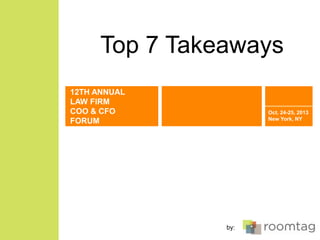COO & CFO Forum: Top 7 Takeaways
- 1. Top 7 Takeaways 12TH ANNUAL LAW FIRM COO & CFO FORUM Oct. 24-25, 2013 New York, NY by:
- 2. 1. Metrics Are Driving Decisions Although firm leaders agree industry benchmarks provide guidance, it is understood that every firm is inherently different. Therefore, the sharing of best practices as proven by measureable data is leading decision making. Increasingly, firm leaders at the Forum discussed how collecting their own metrics via dashboards, etc. have driven decisions matters ranging from matter process to secretary workflow.
- 3. 2. Globalization Needs to be Acknowledged Because new revenues are increasingly becoming zerosum, law firms need some sort of globalization strategy. Partnerships can provide success here and noninternational firms need to be aware of international firms poaching talent.
- 4. 3. The Biggest Gains are in Process Efficiency Regardless of whether the administrative office is outsourced or not, there are many processes that can be improved. Workflow and process efficiency is hindered by various factors such as IT rejection of the cloud or partner driven culture. However, the savings are there and they are real.
- 5. 4. AFAs & Innovative Pricing are Permanent Since 2007, AFAs and innovative pricing strategies have increased and are here to stay. This requires measures such as developing accounting principles or approval processes for transactions and billing. Additionally, training in project management skills and even hiring PM professionals is highly recommended across the industry.
- 6. 5. Clients Driving eBilling Adoption Clients desiring transparency on rates and margins have increasingly switched to electronic billing. However, this has brought new opportunities for billing disputes. Training attorneys and staff in eBilling is essential to avoiding the pitfalls in client pushback.
- 7. 6. COOs & CFOs Will Be More Client Facing After 2007, CFOs have more accounting responsibilities. Profitability is no longer taboo and is proactively addressed with the c-level. Changes in client billing have created roles for the CFO and finance department. Overall, the finance component of law firms have become more analytical and highly skilled regarding client economics.
- 8. 7. ŌĆ£LeanŌĆØ Delivery of Legal Services Two schools of thought apply here: firms that believe ŌĆ£leanŌĆØ operations and legal service delivery creates value across the board (see Seyfarth) and firms that believe this model only serves certain practices. The extreme rigor of ŌĆ£leanŌĆØ methodology may dissuade some firms from all-in commitment and may lead to future hybrid models.








